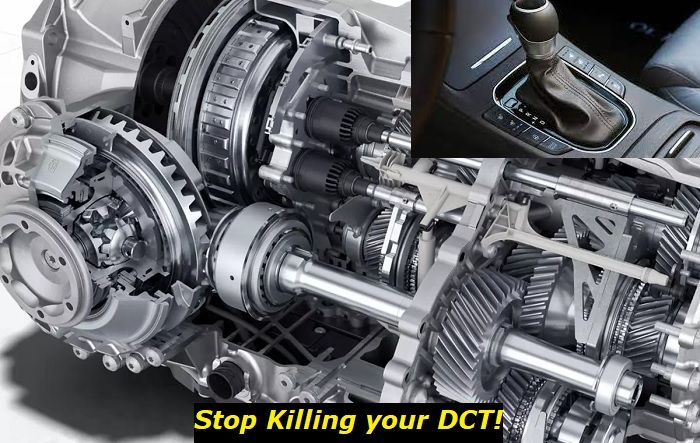The 6.0 Power Stroke engine is a powerful workhorse that is often found in heavy-duty trucks and commercial vehicles. Once this engine is partnered with a reliable transmission, it can provide optimum performance and fuel efficiency. When a transmission problem arises, however, such features get compromised, and repairing the damage can be extremely costly and time-consuming.
6.0 Power Stroke automatic transmission highlights
- Average lifespan:200,000-230,000 miles
- Reliability Score:High
- Prone to minor issues:No
- Price for repair after failure:$1,200-$2,000
- Price for replacement:$5,000-$6,500
- Availability of parts:Average
- Common problems:shuddering and vibrations, noisy operation, issues in upgraded cars.

Common 6.0 Power Stroke Transmission Issues
The 6.0L Power Stroke may not have got the same level of praise as its predecessor, the 7.3L engine, but when it's working properly, it can deliver the right amount of power for heavy-duty trucks or cars to do what they do best. The engine is compatible with different transmission systems produced by different makers. Like every other setup out there though, no combination is ever perfect.
After prolonged use, several problems may start occurring in the transmission system either due to regular wear and tear or bad driving habits on the side of the driver. Such factors can lead to the following:
1. Torque Converter Issues
One of the most common transmission problems with the 6.0 Power Stroke engine is torque converter issues. The torque converter is a fluid coupling that allows the engine to idle without engaging the transmission. When this component fails, it can cause the engine to stall or make it very difficult to shift gears.
2. Slipping Gears
Another common issue with the 6.0 Power Stroke transmission is slipping gears. This can be caused by several factors, including low fluid levels, dirty fluid, worn elements, or a faulty solenoid.
3. Hard Shifting
Hard shifting is another common transmission problem with the 6.0 Power Stroke. Again, this can be caused by factors such as insufficient fluids, dull fluid, defective elements, or a faulty solenoid.
4. Delayed Engagement
Delayed engagement is another common issue with the transmission. These are also related to fluid and solenoid issues.
5. Erratic Shifting
Erratic shifting is another common transmission problem with the 6.0 Power Stroke. As with the other shifting-related issues here, this has something to do with the conditions of the fluid and solenoid.
6. Overheating
One of the most serious transmission problems with this engine is overheating because it can cause serious damage to the vehicle as well as accidents like collisions and fires. In addition to factors like inadequate fluid or fluid contamination, a faulty cooling system can contribute to this, too.
7. Leaking Fluid
Another common transmission problem with the 6.0 Power Stroke is leaking fluid. This can be caused by a number of different factors, including a faulty seal or gasket, loose bolts, or a cracked pan.
8. Noisy Operation
If you notice that your vehicle's transmission is making unusual noises, this could be an indication of a serious problem. Transmission problems can often be accompanied by whining, grinding, or humming noise. These sounds may indicate components that are already in need of replacement like the gears, solenoid, and clutch.
9. Shuddering or Vibration
Red flags such as shuddering or vibrations spell serious trouble for your vehicle. Likewise, these are indicative of parts that already need replacement or fluid.
10. Check Engine Light
One of the most dreaded indicators of transmission problems is the check engine light. If you cannot locate the problem within the engine itself, it is possible that it is triggered by issues related to your transmission. So, it is best to look in there, too.
Things that Could Go Wrong with a Bad Transmission
Should you choose to ignore any of the red flags stated in the previous section, you may end up encountering one or a combination of the following:
- Your car could have trouble shifting gears resulting in poor performance, possible damage to the entire transmission system, and the likelihood of accidents.
- Your engine will have to work harder than necessary in order to compensate, which would lead to increased fuel consumption.
- Your car could make strange squeaking, grinding, or humming noises while in motion because of the increased friction among its moving parts. The noises are not only irritating, but they can also cause panic and be a sign of more problems to come.
- Your car could vibrate excessively while running, which is again due to rough contact in its moving components. Aside from producing an uncomfortable ride quality, this factor can quickly heat up your vehicle's components, too.
- Your car's transmission could ultimately fail, leaving you stranded on the side of the road if things get out of hand in the middle of your trip.
Aside from these mentioned hassles along the way, these will eventually require more expensive repairs due to their tendency to further extend the damage in other areas of your vehicle.
Possible Solutions to 6.0 Power Stroke Transmission Problems
No matter what type of 6.0 Power Stroke transmission problem you are experiencing, it is important to have it diagnosed and repaired as soon as possible. Transmission problems can quickly lead to expensive repairs or even the total replacement of the transmission.
1. Ensure the Quantity and Quality of Your Transmission Fluid
As shown in the previous section, most transmission problems stem from transmission fluid quantity and quality. So, before making things more complicated on your part, start by checking if your transmission fluid is above the minimum recommended level. If possible, top it up until you reach its maximum mark to make sure that all the moving parts of your transmission system are well-lubricated.
Lubrication is important in your transmission because it keeps the moving parts working properly. The lubricant helps reduce friction and wear on the parts, which can lead to problems such as overheating or breakage. Without proper lubrication, transmissions can fail prematurely.
If your vehicle has been sitting in the garage for quite some time, you better check the quality of your transmission fluid before topping it up with a new batch. Once you see that the stock fluid in your transmission is already dirty, drain it first before anything else.
Murky transmission fluid can cause a lot of problems for your car. If it's already too sticky to the touch, it can make the gears slip, which can cause the car to stall or jerk. It can also damage the seals and gaskets in the transmission, which can lead to leaks. All of the other resulting problems can easily pile up until the repair costs get out of hand, so it's important to keep your transmission fluid clean.
2. Patch Up the Leaks
Another source of most problems within the 6.0 Power Stroke transmission system is fluid leaks. Leaks can occur in different places, including seals, gaskets, and hoses. Immediately replace any worn-out components that you find, and make sure that they are connected properly. Leaks can quickly drain your transmission fluid, which can result in inadequate lubrication in your transmission system. Moreover, if the liquid seeping from your transmission ends up reaching any part of your vehicle where it shouldn't be, prepare for more bad news on your part.
3. Ensure that the Cooling System is Working Properly
To fix an overheating transmission, check first if its cooling system is clogged. Make sure also that the cooling line, seals, and gaskets are free from leaks or wear. Replace any defective part that you can find to avoid making things worse.
4. Replace Any Worn-Out Component
For transmission slippage or struggling performance, check if your torque converter, gears, or bands are not worn-out. Change any damaged part that you see or have the component repaired if it's still salvageable. If the transmission slips, it can cause the engine to rev up without increasing your vehicle's speed, which can lead to decreased fuel efficiency and increased wear and tear on the engine.
Avoiding 6.0 Power Stroke Transmission Problems
There are a few things that you can do to avoid 6.0 Power Stroke transmission problems and the costly repairs that go with them.
First, make sure that you keep the transmission fluid at the proper level and change it according to the manufacturer's recommendations. If you do experience transmission problems, the first thing you should do is check the fluid level and add fluid if necessary. Remember to only use the transmission fluid specified by the maker of your auto.
Second, have the transmission serviced regularly by a qualified technician. This will help prevent problems before they even start. As they say, "Prevention is better than cure."
Third, be sure to use only high-quality parts or parts recommended by your vehicle manufacturer when repairing or replacing components in your 6.0 Power Stroke transmission. Substandard alternatives tend to generate inferior transmission performance, and their quick wear may expose your vehicle to more trouble along the way.
Last but not least, take your vehicle to a qualified technician for diagnosis and repair as soon as you notice that its transmission is no longer performing as intended. In some cases, the problem may be something as simple as a loose connection or a faulty component. However, in other cases, the problem may be more serious and require extensive repairs. Regardless, never take your chances with any of these.
Conclusion
Your transmission is as important as your engine. Without one, the other cannot function properly. Always remember to keep your 6.0 Power Stroke transmission in good working order by giving it the proper care and fixing any problem that you may encounter along the way without any delays. Doing so will guarantee the desired performance, fuel economy, and reliability of your auto.
About the authors
The CarAraC research team is composed of seasoned auto mechanics and automotive industry professionals, including individuals with advanced degrees and certifications in their field. Our team members boast prestigious credentials, reflecting their extensive knowledge and skills. These qualifications include: IMI: Institute of the Motor Industry, ASE-Certified Master Automobile Technicians; Coventry University, Graduate of MA in Automotive Journalism; Politecnico di Torino, Italy, MS Automotive Engineering; Ss. Cyril and Methodius University in Skopje, Mechanical University in Skopje; TOC Automotive College; DHA Suffa University, Department of Mechanical Engineering






Add comment